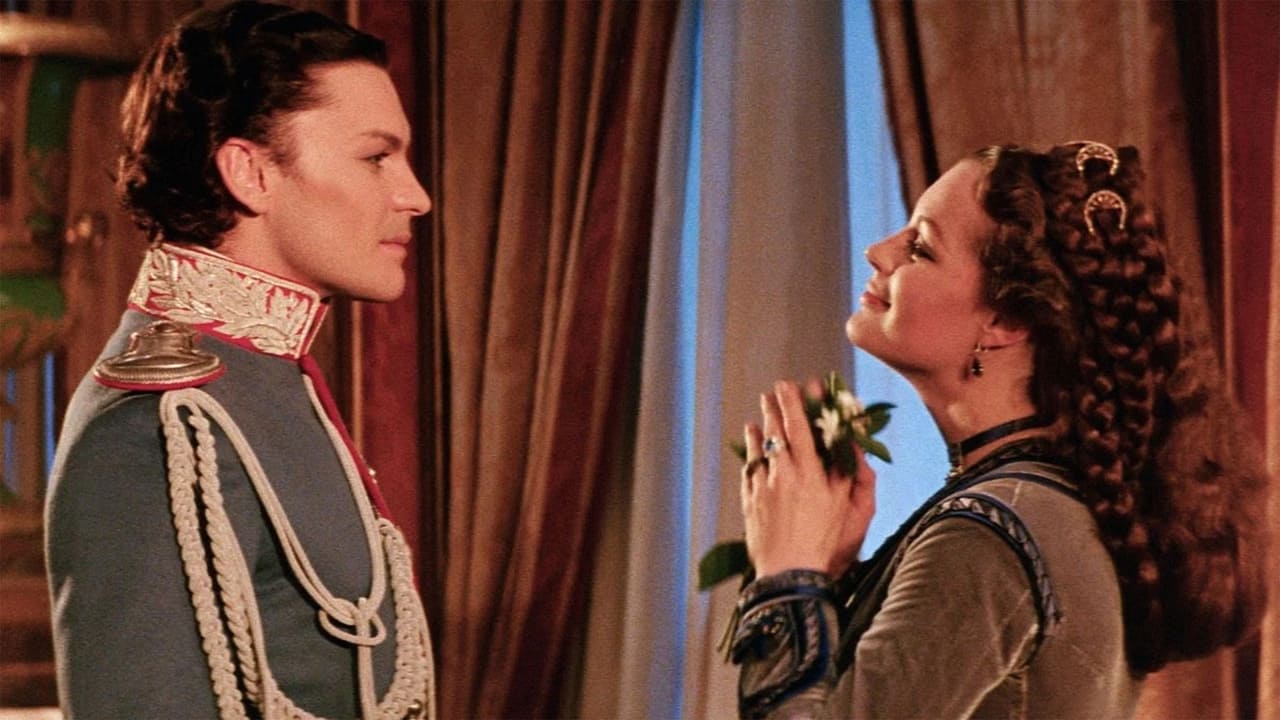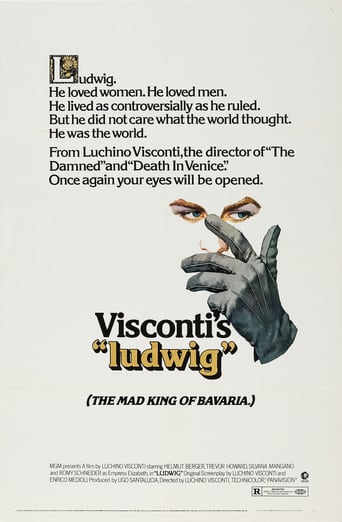gavin6942
Historical evocation of Ludwig, king of Bavaria (Helmut Berger), from his crowning in 1864 until his death in 1886, as a romantic hero. Fan of Richard Wagner (Trevor Howard), betrayed by him, in love with his cousin Elisabeth of Austria (Romy Schneider), abandoned by her, tormented by his homosexuality (or bisexuality?), he will little by little slip towards madness.Special attention must first be drawn to Romy Schneider, who reprises her role as Empress Elisabeth of Austria (from the 1955 film "Sissi" and its two sequels). Playing the same role four times? Admirable... not uncommon, perhaps, but it definitely makes it a character you know deep in your soul. Perhaps this story should have been told from her angle?This really is a European epic. The "epic film" seems to be mainly an American thing, or somethings a British thing, but not typically a continental thing. This is the exception, and it really chronicles a man who is no longer very well known. I am not sure why, other than that perhaps the Bavarian monarchy doesn't really resonate with modern audiences. Though many films have been made about Ludwig, the fact remains his bloodline is quite distant from any ruling family.The late, great critic Roger Ebert was not a fan of the film, or Visconti in general. He said of this feature that "the movie is so lethargic and persistently uninteresting" and considered it "merciful" to see it cut in order to avoid endless amounts of "penetrating stares". Ebert may have never come around to loving the film (he gave it one star), but its reputation has grown over the years.Luckily for fans, Arrow Academy has given "Ludwig" the royal treatment. A 4K scan of the negative makes the picture look better than it ever has. And, of course, Arrow packs the film with extras: an interview with Helmut Berger, an interview with legendary screenwriter Suso Cecchi d'Amico ("Bicycle Thieves" and many others). A half-hour look at actress Silvana Mangano ("Bitter Rice") and a full hour on Luchino Visconti.
ironhorse_iv
Being the final part of Italian director, Luchino Visconti's German Trilogy which also including 1969's "The Damned" and 1971's "Death in Venice". This film about the life and death of King Ludwig II (Helmut Berger) of Bavaria was very disappointing. Honestly, I came out from watching the movie, knowing the same things about the man, when coming in. This movie doesn't seem to want to show, anything new about the guy. Nor does it seems, to wants to analyze the real-life character at all. Its skips and gloss over a lot of the most information parts of his life, such as his childhood's relationship with his father, Maximilian II, his brother, Prince Otto (John Moulder Brown) and Prince Paul. Not only that, but the movie doesn't show why, he was so obsess with composer, Richard Wagner (Trevor Howard) and medieval German folk tales. It would be nice, to hear more about Castle Hohenschwangau's history, or see more of the Gothic Revival style with many frescoes of those heroic fantasy sagas like Tristan and Isolde. Maybe, play more of Wagner's music in the background, rather than walking around the castle in dead silence. I would love the movie to show how, he was able to have a close friendship with the composer, only to over-stalk and praise him, until his lost; but the movie doesn't do that. It rarely focus on them at all. So, you never get to see the true emotional depth of Ludwig's relationship with him. Another thing, that really bug me, about the film, is how they don't show, much of the Austro-Prussian War. For a war that was a big deal of Bavaria's history, you would think, they would show some battle scenes. Sadly, they do not. Instead, they focus on the King hearing bad news from the front lines. You really can't tell, how important, these battles were, by being in the sidelines. One thing, the movie focus, way too much of, is the relationship, he had with Empress Elisabeth of Austria (Romy Schneider). While, it's nice to see Romy Schneider reprises her role as the Empress Elisabeth from 1955's "Sissi" and its two sequels. In truth, the real-life Elisabeth rarely was able to hang out with Ludwig, due to her duties and standings in her own country. I get that, the movie wants to establish that he loves Elisabeth more than Duchess Sophie Charlotte (Sonia Petrovna), but gees, that far from accuracy. Ludwig did love Sophie, and both were very entertained with each other. They were known to often make jokes with each other, make poetic and had a deep interest in the arts, but we rarely see that. Instead, we get tiresome no chemistry shots of them, walking around the castle rooms, or going horseback riding in the pitch dark. It sucks, because these parts takes most of bulk of the first 2 hours of the film. If they did show some chemistry, maybe these scenes would be so boring. If anything, save this movie from being a total drag. It would be the second half of the film. It's here, where the movie gets good, because it kinda show the signs of his so call madness. I love all the scenes with Ludwig and his protégé Joseph Kainz (Folker Bohnet), because it shows how the king declines further in decay and resignation. Even if, the events depict here, are somewhat grotesquely-staged and almost out of sync incorrect, emphasizing that Ludwig's indeed seem confusion and mentally ill. While it's clear that he's peculiar and irresponsible, in truth, the question of his clinical insanity remains unresolved, even today. Another unresolved issue is the mystery of his own death. While, I like the film love to show the conflict with his people, it wasn't as dramatic as it shown in the film. In real-life, Ludwig barely displayed any violent tendencies; and, although he had mentioned suicide, he wasn't that suicidal. So, I don't know, where the film is getting that, from. In real-life, nobody knows, if he was murder or suicide, but the movie acts like he did commit suicide, when clearly, there is no prove of that. However, it's pretty clear, by historians, that the majority of people around him, also knew that he was a closet homosexual. Because of this, I think, this is where the movie fail to exploited. For a film, about a notorious homosexual. The movie doesn't explore Ludwig's sexuality, enough. You would think, that the movie would show more of his relationship with the same-sex. Instead, Visconti's film became a romantic tragic primarily intended to arouse heterosexuals than homosexual, because how much, they focus on his lost on the relationship with women, rather than with the men in his life. Because of this, it made love story relationship, seem so bland and generic. Rather than engaging for both sexes. Despite that, I do like how the filmmakers were able to film at, his real-life castle locations. It made the film, seem so authentic. I have to give director Visconti, props for that, and also doing all the filmmaking, even after suffering a stroke. I just wish the movie would be shorter. There was no need for this European cut film to be, nearly 4 hours long. Even the English version is a hard watch, with 3 hrs. It was so bloated and badly paced. Just way too much padding and dry scenes that could have either been excised or shortened. Nevertheless, the movie's greatest pro is the acting. Everybody did alright, however, Berger appearance as Ludwig stands out. He was amazing. He was perfect for the part. Overall: While, this movie isn't as bad, as directors Marie Noelle & Peter Sehr 2012's film, 'Ludwig II" or "1972's Ludwig: Requiem for a Virgin King". It's extremely boring running time, ruin what could had been a good epic film. Can't recommended.
punishmentpark
An almost four hours long tale of how King Ludwig II loses his empire, his loves and his mind. Starting with his coronation, and ending with his final demise, it tells the stories of his great loves; his love for (the music of) Wagner, his love for his (married) niece Elizabeth (which remains ultimately unrequited, and he then he gets engaged to another niece, but they never marry), his love for opera, men... and the moon. He spends the fortunes of Bavaria on building gigantic new (mostly unoccupied) castles, becomes addicted to chloroform and finally is dethroned after indicating he wants to commit suicide.That would be it in a nutshell, though not all seems entirely correct. Elsewhere it says he was also sexually involved with a certain prince, but that is not implied here. And it was not until 2007 that it was revealed that he was probably killed by hit men. Many scenes are very long, but they are very aptly shot, the acting is very good and the costumes and settings are impeccable. The story is never hard to follow and the dialogues are intriguing, to say the least.I'm not the one to decide if this is a masterpiece or not, but I have no arguments to claim otherwise, either. But this is indeed a far cry from the Sissi trilogy (as expected) and a very good film. It's too bad that it is in Italian - it should have been in German of course - but alas.A big 8 out of 10 nonetheless.

